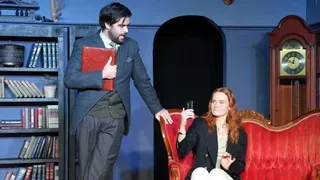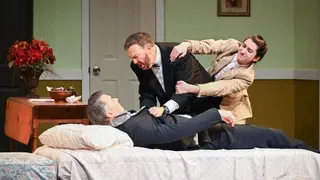May 15, 2014
A Loss of Roses
Andy Smith READ TIME: 3 MIN.
Based on the success of his relatively modest body of work, William Inge's batting average was far better than those of Eugene O'Neill, his friend Tennessee Williams and other acclaimed 20th Century playwrights.
So after his first four -- "Picnic," "Bus Stop," "Come Back, Little Sheba" and "The Dark at the Top of the Stairs" -- all enjoyed Broadway success, Inge was overdue for a flop when "A Loss of Roses" opened on Broadway in 1959 and closed after 25 performances. It's unfortunate that this deeply depressed man couldn't cope with the play's failure, followed it with two more Broadway flops, and eventually committed suicide in the early 1970s.
On paper, "A Loss of Roses" initial failure makes Inge's play a perfect subject for rediscovery by Peccadillo Theater Company, which for 20 years has focused on rediscovering overlooked or seldom-revived works, from Jazz Age shockers like "The Shanghai Gesture" (1926), to "Another Part of the Forest" (1946), Lillian Hellman's overlooked prequel to "The Little Foxes."
It's an interesting play, but not as strong as the Kansas writer's better-known hits. Its strengths and failings are apparent in the overly expository opening scene -- a tense summer dinner shared by widow Helen Baird (Deborah Hedwall) and Kenny (Ben Kahre), her 21-year-old son. A master of character delineation with a gift for creating plausible dramatic situations in seemingly uneventful Midwestern lives, Inge's failure here is a heavy-handed approach which compels him to spell out his intentions in the first few scenes, all weighed down with too-much backstory and the sound of a hurdy-gurdy playing at a nearby skating rink.
On the plus side, his three main characters emerge as interesting, fully-developed people who grow more interesting as the play develops.
It's the early 1930s in a small town near Kansas City. Work is hard to come by, so Kenny and Helen are lucky to have solid jobs, as a gas station mechanic and nurse, respectively. Their relatively peaceful lives are disrupted when Helen takes in her old friend Lila Green (Jean Lichty), an out-of-work actress who once worked as a maid/caretaker for the family when Kenny was a young boy and his father still alive.
Lila turns up at dusk, dropped off by other members of her out-of-work stock troupe, who offer a brief, over-simplified glimpse into Lila's chaotic life since she left town. They include Madame Olga (veteran Patricia Hodges overdoing it in a highly theatrical bit), aging male juvenile Ronnie (the excellent Marty Thomas) and Lila's lover Ricky, a handsome, menacing heavy both on- and offstage (Jonathan Stewart). "I'm always attracted to the villain," Lila (over) shares in a prime example of Inge's refusal to trust his audience.
Following a quick pit stop at the Baird's, the other three move on to Kansas City, looking for work. Lila stays, cooking, cleaning helping and sliding back into her caretaker role from 15 years before, nurturing the needy, handsome Kenny, while fighting a mutual attraction.
Emotionally and psychologically fragile, she's struggling to figure out her next move without falling into another in a series of damaging relationships. Knowing the miserable youth her friend endured at the hands of an abusive stepfather, Helen does what she can to protect bruised, trusting Lila.
Despite juicy characters to work with, the performances are uneven. Jean Lichty's voice and look are reminiscent of the late Jill Clayburgh and she brings a strong commitment to Lila, a role she's played before. So it's surprising that she still doesn't seem comfortable in the part. Great in her final few scenes, Lichty spends much of the play offering inexplicably strident line readings, even in quiet moments of tenderness.
In the small-town heartthrob role that boosted Warren Beatty to stardom, Kahre finds the right balance of sensitivity, listless frustration and cloddishness, while
Deborah Hedwall, the best of the three, shines as a concerned single mother struggling to push her resistant son out of the nest.
Brushing aside the play's flaws, Peccadillo's team has done a nice job with this revival, which is based on Inge's approved version of the play, not the one panned on Broadway 55 years ago. Artistic Director Dan Wackerman guides the production with a solid appreciation for Inge's work and the rhythms of small-town life.
Marianne Custer's costumes suit the period, as does Harry Feiner's set, filled with a mix of worn but solid furniture, accurate choices for a frugal widow's house in a small Kansas town. Everything about their production looks and feels right.
"A Loss of Roses" runs through June 7 at Theatre at St. Clement's, 423 West 46th Street New York, NY. For tickets or information, visit www.ThePeccadillo.com.







